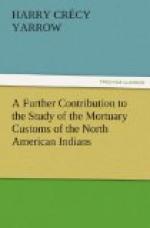well mounted and caparisoned among his fellows in the
other world. Formerly, if the deceased were
a chief or man of consequence and had large herds
of ponies, many were killed, sometimes amounting
to 200 or 300 head in number.
The Comanches illustrate the importance of providing a good pony for the convoy of the deceased to the happy-grounds by the following story, which is current among both Comanches and Wichitas:
“A few years since, an old Comanche died who had no relatives and who was quite poor. Some of the tribe concluded that almost any kind of a pony would serve to transport him to the next world. They therefore killed at his grave an old, ill-conditioned, lop-eared horse. But a few weeks after the burial of this friendless one, lo and behold he returned, riding this same old worn-out horse, weary and hungry. He first appeared at the Wichita camps, where he was well known, and asked for something to eat, but his strange appearance, with sunken eyes and hollow cheeks, filled with consternation all who saw him, and they fled from his presence. Finally one bolder than the rest placed a piece of meat on the end of a lodge-pole and extended it to him. He soon appeared at his own camp, creating, if possible, even more dismay than among the Wichitas, and this resulted in both Wichitas and Comanches leaving their villages and moving en masse to a place on Rush Creek, not far distant from the present site of Fort Sill.
“When the troubled spirit from the sunsetting world was questioned why he thus appeared among the inhabitants of earth, he made reply that when he came to the gates of paradise the keepers would on no account permit him to enter upon such an ill-conditioned beast as that which bore him, and thus in sadness he returned to haunt the homes of those whose stinginess and greed permitted him no better equipment. Since this no Comanche has been permitted to depart with the sun to his chambers in the west without a steed which in appearance should do honor alike to the rider and his friends.”
The body is buried at the sunsetting side of the camp, that the spirit may accompany the setting sun to the world beyond. The spirit starts on its journey the following night after death has taken place; if this occur at night, the journey is not begun until the next night.
Mourning observances.—All the effects of the deceased, the tents, blankets, clothes, treasures, and whatever of value, aside from the articles which have been buried with the body, are burned, so that the family is left in poverty. This practice has extended even to the burning of wagons and harness since some of the civilized habits have been adopted. It is believed that these ascend to heaven in the smoke, and will thus be of service to the owner in the other world. Immediately upon the death of a member of the household, the relatives begin a peculiar




